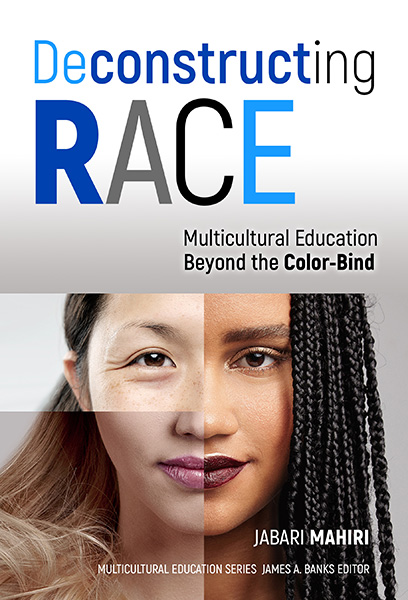Professors: Request an Exam Copy
Print copies available for US orders only. For orders outside the US, see our international distributors.
Publication Date: July 28, 2017
Pages: 240
Series: Multicultural Education Series

How do socially constructed concepts of race dominate and limit understandings and practices of multicultural education? Since race is socially constructed, how do we deconstruct it?
In this important book Mahiri argues that multicultural education needs to move beyond racial categories defined and sustained by the ideological, social, political, and economic forces of white supremacy. Exploring contemporary and historical scholarship on race, the emergence of multiculturalism, and the rise of the digital age, the author investigates micro-cultural practices and provides a compelling framework for understanding the diversity of individuals and groups.
Descriptions and analysis from ethnographic interviews reveal how people’s continually evolving, highly distinctive, micro-cultural identities and affinities provide understandings of diversity not captured within assigned racial categories.
Synthesizing the scholarship and interview findings, the final chapter connects the play of micro-cultures in people’s lives to a needed shift in how multicultural education uses race to frame and comprehend diversity and identity and provides pedagogical examples of how this shift can look in teaching practices.
Jabari Mahiri is a professor of education and the William and Mary Jane Brinton Family Chair in Urban Teaching at the University of California, Berkeley. In addition to his work with the Multicultural Urban Secondary English Program and the Bay Area Writing Project, he is on the board of the National Writing Project and also a board member of the American Educational Research Association, 2014 through 2017.
"As a nation, we seem unable to reconcile our stated principles of equality, freedom, and liberty for all against realities of white supremacist ideologies and principles that continue to subjugate and relegate people of color to the margins. But what if we were to get beyond the categories that constrain, confine, and entrench white supremacy? Jabari Mahiri opens the door for just such considerations."
—Teachers College Record
"Indeed, this specific book is timely given the current social and political climate
of the USA and internationally, and offers fodder for critical discussions about the
concepts of race, ethnicity, and culture as they relate to diverse individuals’ identities,as well as provides directions for future research."
—Human Development
"The gem of Mahiri’s text is that it works on both the scholarly and the personal levels simultaneously. Mahiri presents his own stories as well as those of his interviewees and captures the core of the deconstruction of race."
—Multicultural Education Review
"For educators in the fields of theology, religious studies, or multicultural ministry, the main appeal of this contribution may reside precisely in the richness of its ethnographical survey and, more specifically, in the testimonies of subjects classified within a certain race."
—Reflective Teaching
“Jabari Mahiri’s superb Deconstructing Race isthe best modern book on multiculturalism in education. More than that, it can be the beginning of a vital transformation of the field and of our views about diversity.”
—James Paul Gee, Mary Lou Fulton Presidential Professor of Literacy Studies, Regents’ Professor, Arizona State University
"Altering the immutable, degenerative concepts of race that perpetuate impenetrable boundaries among "racialized" groups and myths of underachievement about people of color requires a seismic catalyst grounded in irrefutable research and inspirational evidence. Deconstructing Race is that seismic catalyst, providing the potential alchemy for an American narrative of racial promise yet unrealized."
—Yvette Jackson, chief executive officer of the National Urban Alliance for Effective Education
"Brilliant and thought-provoking, Deconstructing Race makes a compelling case for addressing societal inequalities by changing how we think about race. This groundbreaking book is a must-read for scholars of race and education, and for those seeking to better support the learning and development of youth."
—Na'ilah Suad Nasir, Vice Chancellor of Equity & Inclusion, UC Berkeley
2018 AESA Critic’s Choice Award
2018 “Must Read” by the Center for Urban Education (CUE) at the University of Pittsburgh
2018 Prose Award in Education Theory, Honorable Mention
The Chronicle of Higher Education Weekly Book list, August 11, 2017
Table of Contents
Series Foreword by James A. Banks
Acknowledgments
Chapter 1. Writing Wrongs
Learning from the Lives of Others
Key Concepts
Chapter Overviews
Chapter 2. Deconstructing Race
Multicultural Education
Learning from Literature
Prospects and Imperatives
Chapter 3. The Color-Bind
Prisons of Racial Identity
Prisms of Racial Identity
325 Million Stories
Chapter 4. Pretending to Be White
Hyperdiversity
Stereotyping
Identity Constructions
Lifting the White Veil
Chapter 5. Passing for Black
Blacklash
Illegible Skin
Man Up
A Good Black Man
Cyber-Lives
Hip-Hop Life
Clap Back!
Chapter 6. No Body's Yellow
Sassy
Hapa
Hyphen-Nation
Pigmentocracy
Media Portrayals
Mediums of Hip-Hop
Enter the Dragon
Chapter 7. The Brown Box
Blacxican
Colombian
Cholo
Chicano
Digital Acts
Hip-Hop Action
Breaking the Piñata
Chapter 8. Red Rum
Citizen Potawatomi
Urban Indians
Mexica
Res-Girl
Virtual Presence
Presence of Hip-Hop
Listening to Spirits
Chapter 9. Micro-Cultures
Identity Contingencies
Digital Culture
Hip-Hop Culture
Interstitial Space
Chapter 10. Challenges of Multicultural Education
Personal Perspectives Project
From Beirut to Oakland
Integrating Restorative Discipline Principles
Multicultural Education 2.0
A-mericans
Appendix A: Personal Perspectives Project
Shivani Savdharia
Appendix B: From Beirut to Oakland: Long-Distance Shared Inquiry on Immigrants and Refugees
Yael Friedman
Appendix C: Integrating Restorative Discipline Principles into Classroom Content
Eva Marie Oliver
Appendix D: Personal Profile
Kylie Garcia
References
Index
About the Author
Professors: Request an Exam Copy
Print copies available for US orders only. For orders outside the US, see our international distributors.